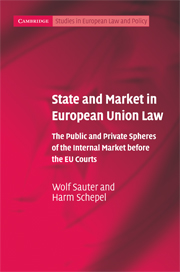 State and Market in European Union Law
State and Market in European Union Law Published online by Cambridge University Press: 22 January 2010
Introduction
Article 31 EC deals with the position of commercial State monopolies, in particular in so far as they introduce discrimination regarding the conditions under which goods are procured and marketed (for example, in the case of import and export monopolies). As such, it forms a lex specialis in relation to the general rules pertaining to the trade in goods – and following the end of the transitional period it is, like Article 28 EC, directly effective. Also, in dealing with State monopolies, Article 31 EC bridges the free movement and competition rules. Article 31 EC does not require national monopolies of a commercial character to be abolished, nor, as demonstrated by Costa, is it illegal to create new commercial State monopolies.
Instead, Article 31 EC aims to reconcile the existence of such monopolies with the requirements of the establishment and functioning of the internal market – in particular, after the expiration of the transitional period, with the non-discrimination requirement.4 Thus the Member States are required to ‘adjust’ the monopolies concerned.
According to the Court, in its 1997 Franzén Case:
It is clear not only from the wording of Article 37 [now Article 31] but also from the position which it occupies in the general scheme of the Treaty that the article is designed to ensure compliance with the fundamental principle that goods should be able to move freely throughout the common market, in particular by requiring quantitative restrictions and measures having equivalent effect in trade between Member States to be abolished, and thereby to ensure maintenance of normal conditions of competition between the economies of Member States in the event that a given product is subject, in one or other of those States, to a national monopoly of a commercial character.
To save this book to your Kindle, first ensure [email protected] is added to your Approved Personal Document E-mail List under your Personal Document Settings on the Manage Your Content and Devices page of your Amazon account. Then enter the ‘name’ part of your Kindle email address below. Find out more about saving to your Kindle.
Note you can select to save to either the @free.kindle.com or @kindle.com variations. ‘@free.kindle.com’ emails are free but can only be saved to your device when it is connected to wi-fi. ‘@kindle.com’ emails can be delivered even when you are not connected to wi-fi, but note that service fees apply.
Find out more about the Kindle Personal Document Service.
To save content items to your account, please confirm that you agree to abide by our usage policies. If this is the first time you use this feature, you will be asked to authorise Cambridge Core to connect with your account. Find out more about saving content to Dropbox.
To save content items to your account, please confirm that you agree to abide by our usage policies. If this is the first time you use this feature, you will be asked to authorise Cambridge Core to connect with your account. Find out more about saving content to Google Drive.